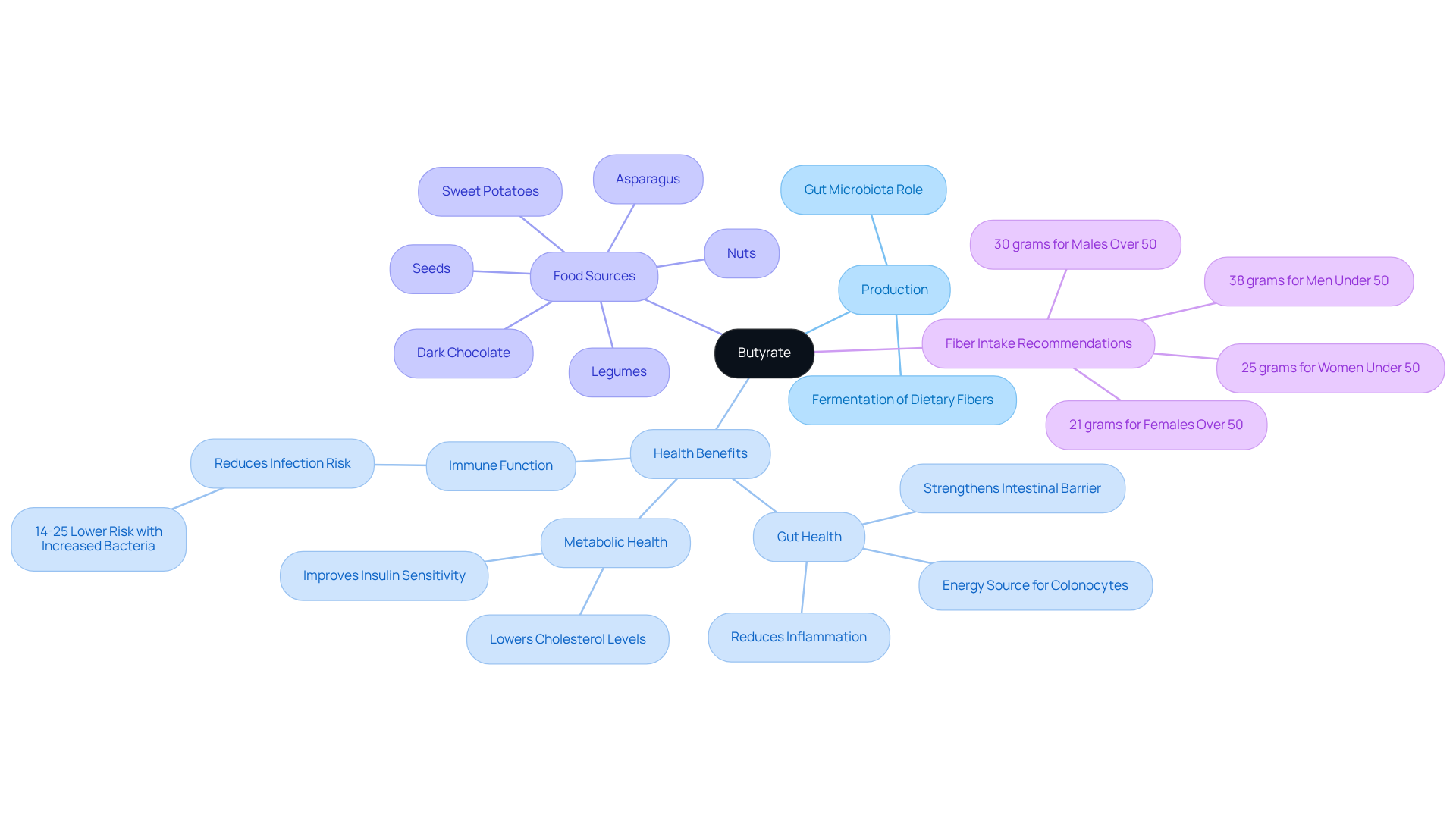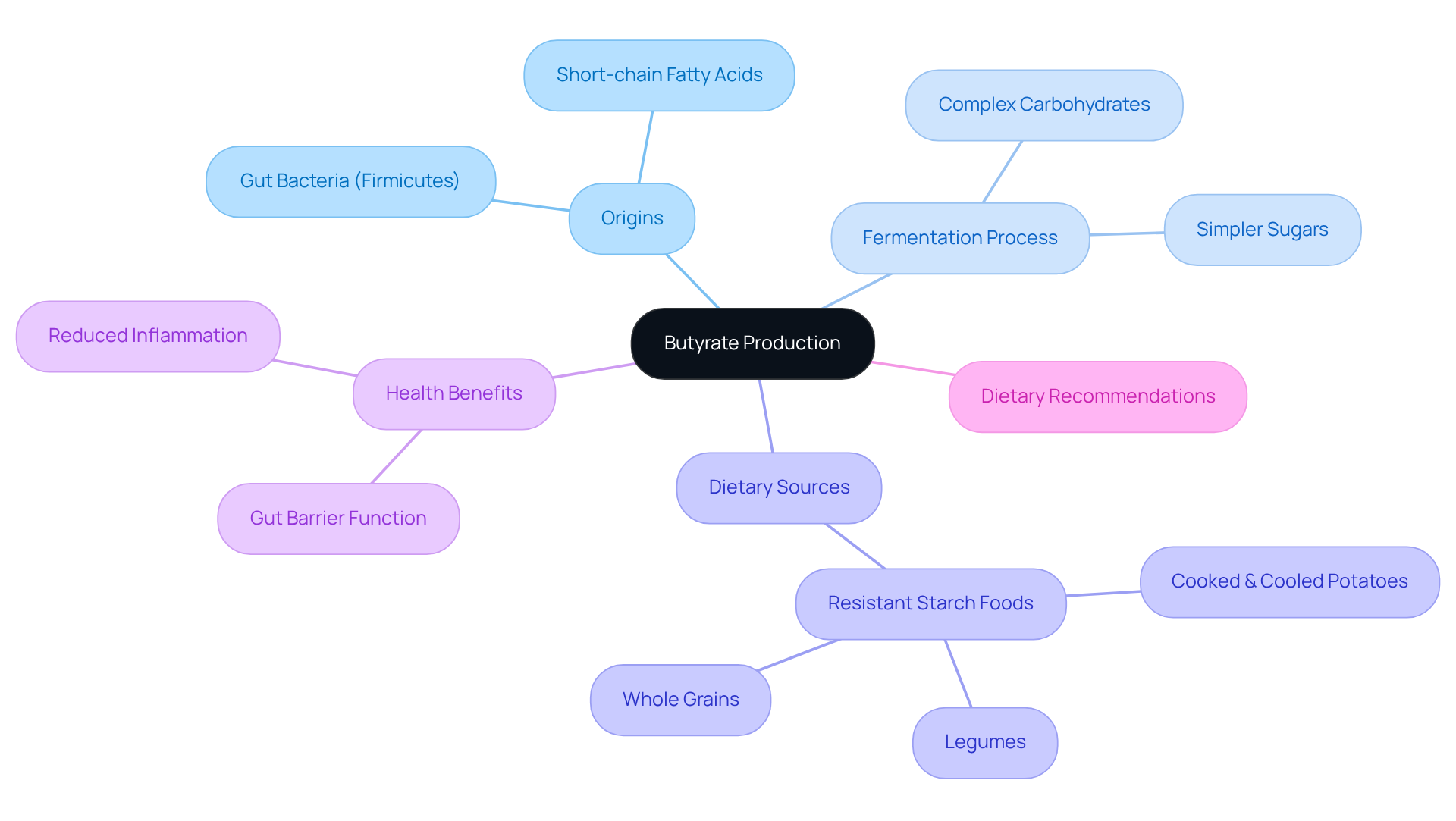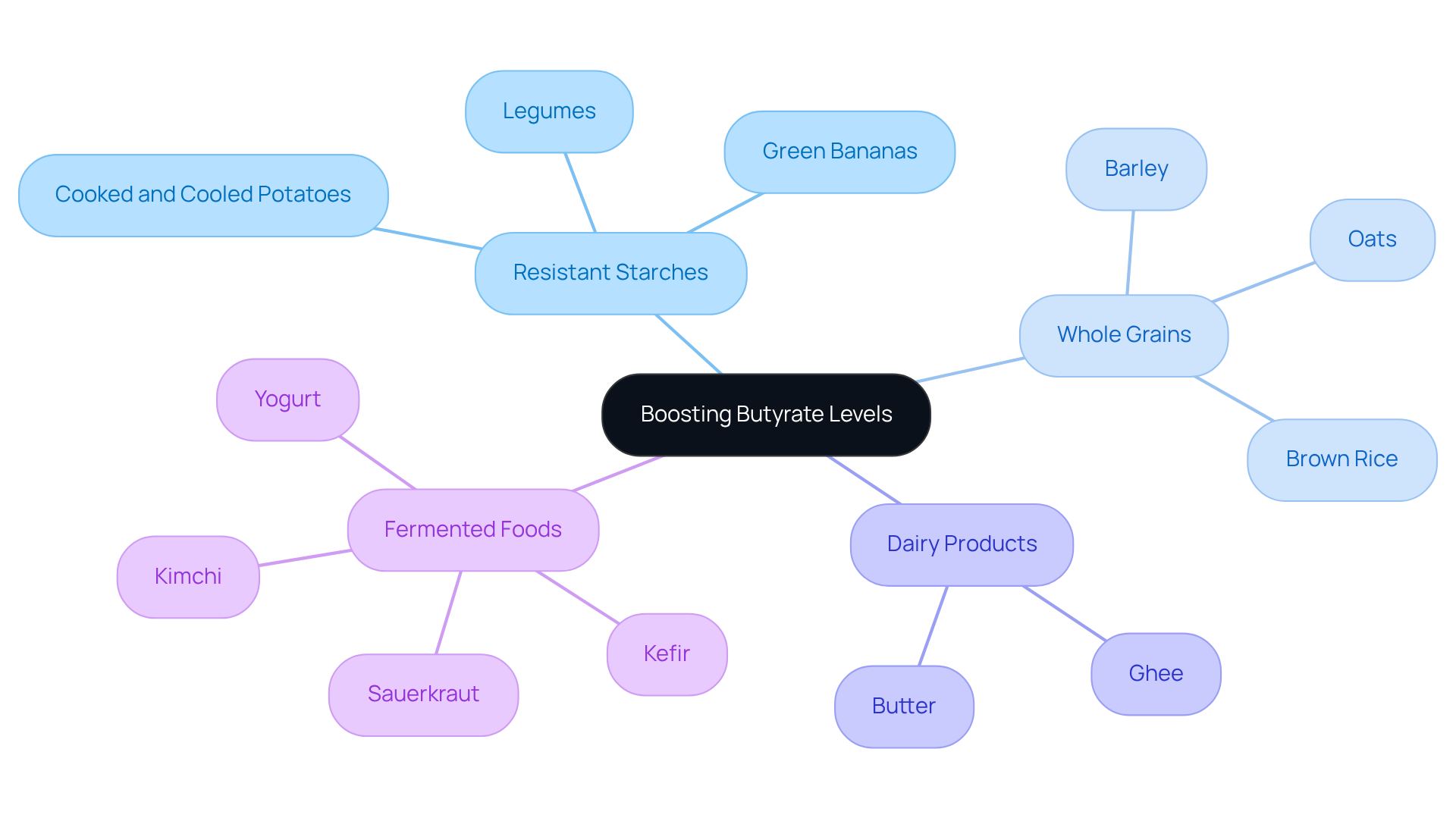Understanding the Benefits of Butyrate for Health and Wellness
Overview
This article explores the numerous health benefits of butyrate, a short-chain fatty acid produced in the colon. It highlights its essential role in gut health and overall wellness. Butyrate enhances intestinal barrier integrity, reduces inflammation, and improves metabolic health. Furthermore, it discusses dietary sources that can increase butyrate levels, such as high-fiber foods and resistant starches.
Why is butyrate important? It supports the gut lining, which is crucial for preventing leaky gut syndrome. Additionally, by reducing inflammation, butyrate contributes to better overall health. To boost your butyrate levels, consider incorporating more high-fiber foods into your diet.
In conclusion, understanding butyrate’s benefits can lead to improved health choices. Explore further resources to learn how to enhance your diet for better gut health.
Introduction
Butyrate, a short-chain fatty acid produced in the colon, plays a pivotal role in maintaining gut health and overall wellness. Its influence extends beyond digestion, offering benefits such as:
- Improved metabolic health
- Reduced inflammation
- Enhanced immune function
However, many individuals struggle to incorporate sufficient dietary fiber into their diets. This raises an important question: how can one effectively boost butyrate levels to harness its full health potential?
Exploring the origins, benefits, and dietary sources of butyrate reveals essential strategies for enhancing well-being through nutrition.
Define Butyrate: Understanding Its Role in Health
Butyrate, or butyric acid, is a short-chain fatty acid (SCFA) primarily produced in the colon through the fermentation of dietary fibers by gut microbiota. This essential compound serves as a primary energy source for colonocytes, the cells lining the colon, fulfilling approximately 70% of their energy needs and playing a vital role in maintaining gut health. Studies indicate that butyrate possesses significant anti-inflammatory properties and enhances the strength of the intestinal barrier, thereby contributing to digestive function and overall well-being.
The benefits of butyrate extend beyond the digestive system. For instance, research has shown that this compound can lower circulating cholesterol levels and improve insulin sensitivity, both of which are crucial for metabolic health. Notably, a statistic reveals that for every 10% increase in butyrate-producing bacteria, the risk of hospitalization for infections decreases by 14% to 25%. This underscores its protective role in immune function.
Nutritionists stress the importance of including butyrate-rich foods in the diet. Foods such as:
- Sweet potatoes
- Asparagus
- Nuts
- Seeds
- Dark chocolate
- Legumes
not only promote the production of short-chain fatty acids but also support a balanced gut microbiome. Case studies demonstrate that individuals with higher levels of certain short-chain fatty acids experience improved gut barrier function and reduced inflammation, which are essential for preventing conditions like colorectal cancer.
In summary, the benefits of butyrate make it a key player in gut health, offering numerous advantages that support both digestive and overall wellness. Its role in enhancing colonocyte energy, preserving intestinal integrity, and providing anti-inflammatory effects highlights the importance of nutritional strategies that promote butyric acid production. Furthermore, adults should aim for a fiber intake of:
- 21 grams for females
- 30 grams for males over 50
as this is crucial for stimulating production through dietary adjustments. While butyric acid is available in supplement form, potential side effects should be considered, making food sources generally more desirable.

Explore the Origins and Production of Butyrate
Butyrate is primarily synthesized in the colon through the fermentation of dietary fibers by specific gut bacteria, particularly those from the Firmicutes phylum. Foods rich in resistant starch, such as cooked and cooled potatoes, legumes, and whole grains, are particularly effective in promoting the production of short-chain fatty acids. The fermentation process involves decomposing complex carbohydrates into simpler sugars, which gut bacteria utilize to produce short-chain fatty acids. This underscores the essential function of a fiber-rich diet in improving gut health and showcasing the benefits of butyrate.
Recent studies suggest that high-fiber diets can significantly increase short-chain fatty acid (SCFA) production. One important metabolite associated with this increase is linked to the benefits of butyrate, including enhanced gut barrier function and decreased inflammation. Furthermore, research indicates that the consumption of whole grains consistently boosts the abundance of beneficial gut bacteria, which are essential for realizing the benefits of butyrate production. As fiber intake remains low in many developed nations, increasing the consumption of fiber-rich foods is crucial for promoting gut health and overall well-being.
Significantly, individuals on the Western-style eating plan have an average fiber consumption of only 21 g/day, while those on a healthy carbohydrate regimen consume around 68 g/day. This highlights the necessity for nutritional adjustments. Marius Vital observes that specific fibers can induce a bifidogenic effect, thereby providing benefits of butyrate through enhanced butyric acid production. However, it is important to consider that excessive levels of this compound may have adverse effects, emphasizing the need for a balanced approach to dietary fiber intake.

Highlight Key Health Benefits of Butyrate
Butyrate offers a range of significant health benefits, including:
-
Anti-inflammatory Effects: Butyrate plays a crucial role in reducing inflammation both in the gut and systemically. This is essential for preventing chronic diseases. Research suggests that this compound can reduce pro-inflammatory cytokines, including IL-6 and IL-12, thus enhancing its anti-inflammatory effects.
-
Gut Barrier Integrity: This short-chain fatty acid strengthens the intestinal barrier, effectively preventing conditions such as ‘leaky gut’ that can lead to systemic inflammation. Research indicates that butyrate enhances tight junction assembly by increasing claudin-1 levels, which is vital for maintaining gut integrity and preventing permeability issues.
-
Support for Gut Microbiota: Butyrate promotes the growth of beneficial gut bacteria while inhibiting harmful strains, fostering a balanced microbiome. Why is this balance important? Dysbiosis is associated with various wellness issues, including obesity and inflammatory bowel disease (IBD).
-
Metabolic Health: Evidence indicates that this short-chain fatty acid enhances insulin sensitivity and may aid in weight management by controlling appetite and energy metabolism. Clinical studies have demonstrated that butyric acid supplementation can result in substantial decreases in body weight and fat in older adults, emphasizing its potential in metabolic wellness management.
-
Colon Health: Consistent generation of short-chain fatty acids is linked to a lower risk of colorectal cancer. It fosters the growth of healthy colonocytes while promoting apoptosis in damaged cells, thus playing a protective role in colon condition. Significantly, this short-chain fatty acid has been demonstrated to trigger apoptosis in cancerous colonocytes at levels exceeding 2 mM, highlighting its promise as a therapeutic agent in cancer prevention.
These findings clarify the significance of butyrate and highlight the benefits of butyrate not only in gut health but also in wider metabolic and systemic health contexts. Explore further to understand how incorporating butyrate into your diet can enhance your overall well-being.

Identify Dietary Sources and Ways to Boost Butyrate Levels
To effectively increase butyric acid levels, individuals should prioritize high-fiber foods in their diets to maximize the benefits of butyrate. Key dietary sources include:
- Resistant Starches: Foods such as cooked and cooled potatoes, green bananas, and legumes are rich in resistant starch, which is crucial for butyrate production. These foods resist digestion in the small intestine, enabling helpful gut bacteria to ferment them into fatty acids.
- Whole Grains: Oats, barley, and brown rice are excellent sources of dietary fiber that aid in the production of short-chain fatty acids. Incorporating these grains into meals can significantly improve digestive function.
- Dairy Products: Full-fat dairy options such as butter and ghee naturally contain a fatty acid, contributing directly to its levels in the body. While these can be beneficial, moderation is key to avoid excessive saturated fat intake.
- Fermented Foods: Probiotic-rich items like yogurt and kefir not only improve gut function but also promote the growth of butyrate-producing bacteria, which are essential for the benefits of butyrate. Regular consumption of these foods can lead to improved gut microbiome balance.
Furthermore, boosting overall fiber consumption and exploring prebiotic supplements can further enhance short-chain fatty acid production in the gut. Aiming for at least 25 grams of total fiber each day is advised, as this can result in improved wellness, including reduced inflammation and enhanced gastrointestinal function. By making these dietary adjustments, individuals can effectively enhance their butyrate levels and enjoy the benefits of butyrate for their overall health.

Conclusion
Butyrate, a short-chain fatty acid produced through the fermentation of dietary fibers, plays a crucial role in maintaining gut health and overall wellness. Its importance extends beyond the digestive system, influencing metabolic health and immune function. Understanding the multifaceted benefits of butyrate emphasizes the need for dietary strategies that promote its production, highlighting its status as a vital component for sustaining health.
The article outlines several key insights into butyrate’s benefits, including:
- Its anti-inflammatory properties
- Support for gut barrier integrity
- Its role in promoting a balanced gut microbiome
Furthermore, it emphasizes how butyrate enhances metabolic health by improving insulin sensitivity and aiding in weight management. The discussion also points out the significance of high-fiber foods, such as resistant starches, whole grains, and fermented products, in boosting butyrate levels within the body.
Incorporating butyrate-rich foods into daily diets is not just a recommendation; it is a pathway to enhancing one’s overall health. By prioritizing fiber intake and making conscious dietary choices, individuals can unlock the myriad benefits of butyrate, fostering better gut health and reducing the risk of chronic diseases. Embracing these nutritional adjustments could lead to significant improvements in wellness, making the pursuit of butyrate a worthwhile endeavor for anyone seeking to enhance their health and vitality.
Frequently Asked Questions
What is butyrate and how is it produced?
Butyrate, or butyric acid, is a short-chain fatty acid (SCFA) primarily produced in the colon through the fermentation of dietary fibers by gut microbiota.
What role does butyrate play in gut health?
Butyrate serves as a primary energy source for colonocytes, fulfilling approximately 70% of their energy needs, and plays a vital role in maintaining gut health by enhancing the strength of the intestinal barrier and possessing anti-inflammatory properties.
How does butyrate affect metabolic health?
Butyrate can lower circulating cholesterol levels and improve insulin sensitivity, which are crucial for metabolic health.
What is the relationship between butyrate-producing bacteria and immune function?
For every 10% increase in butyrate-producing bacteria, the risk of hospitalization for infections decreases by 14% to 25%, highlighting butyrate’s protective role in immune function.
Which foods are rich in butyrate or promote its production?
Foods that promote butyrate production include sweet potatoes, asparagus, nuts, seeds, dark chocolate, and legumes.
What are the health benefits associated with higher levels of short-chain fatty acids?
Individuals with higher levels of certain short-chain fatty acids experience improved gut barrier function and reduced inflammation, which are essential for preventing conditions like colorectal cancer.
What is the recommended fiber intake to stimulate butyrate production?
Adults should aim for a fiber intake of 21 grams for females and 30 grams for males over 50 to stimulate butyrate production through dietary adjustments.
Can butyrate be taken as a supplement?
Yes, butyric acid is available in supplement form, but potential side effects should be considered, making food sources generally more desirable.






